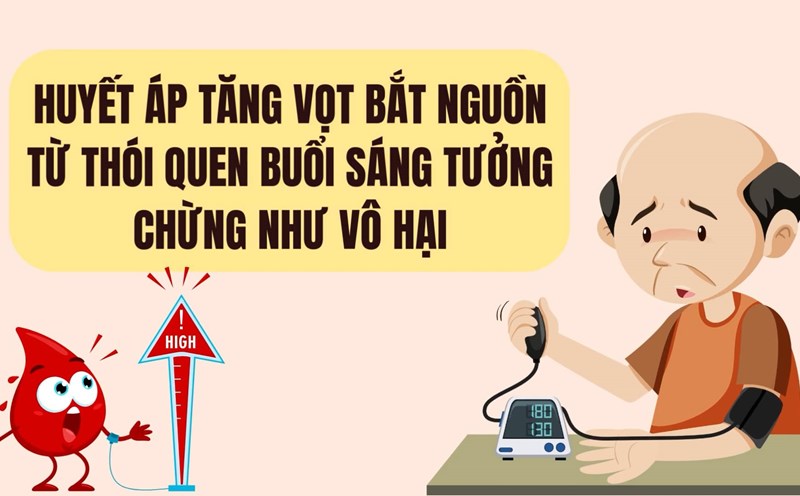Many people were surprised to discover that their blood pressure fluctuated by the hour during the day. In fact, blood pressure usually starts to increase from 6am, reaches a peak of about 10am and then gradually stabilizes. This phenomenon is called "morning high blood pressure" and is directly related to the body's biological clock.
Why does blood pressure increase in the morning?
Experts explain that blood pressure fluctuations follow circadian rhythms, the mechanism for regulating sleep-wake cycles. When night falls, the body secretes melatonin to help sleep deeply and dilate blood vessels, causing blood pressure to decrease by about 10 - 20%. In contrast, in the morning, sunlight stimulates the body to produce cortisol, a hormone that causes blood vessels to constrict and increase blood pressure.
morning high blood pressure is a normal physiological reaction, but if the index increases too much and continues, it becomes a leading risk factor for stroke and heart attack, says Dr Amelia MacIntyre, DO, a cardiologist at Oxford University (UK).
In addition to circadian rhythm, many other factors also cause blood pressure to fluctuate, such as old age, diabetes, chronic kidney disease, drinking alcohol at night, stress, insomnia or changes in environmental temperature. In the cold winter, the risk of sudden increases in morning blood pressure is even more obvious.
When do blood pressure fluctuations become dangerous?
For healthy people, a slight increase in the morning is not worth worrying about. However, if the index often exceeds 130/80 mmHg, especially in people with high blood pressure, the risk of cardiovascular complications will be many times higher.
A 2023 study shows that people with high blood pressure have an increased cardiopulmonary blood pressure level of 10 mmHg in the morning, the risk of stroke increases by 232%, the risk of death from cardiovascular disease increases by 270%.
Notably, not everyone has this type of increase. Some people experience reverse high blood pressure, meaning blood pressure drops during the day but is higher at night. This condition affects about 13% of adults and also increases the risk of heart failure, mental decline, and kidney damage if prolonged.
What to do to safely control blood pressure?
Experts recommend that people at risk should measure their blood pressure many times a day to have a comprehensive view, instead of only measuring in the morning. If necessary, the doctor can use a 24-hour monitor to detect abnormal fluctuations.
According to Dr. Dennis Sifris, MD, internal medicine specialist at Mount Sinai Hospital, New York (USA), lifestyle changes are a core factor in controlling blood pressure. A low-salt diet, 7-9 hours of sleep, maintaining exercise and managing stress will make a big difference".
In addition, patients need to limit alcohol, avoid staying up late and maintain a reasonable weight. When there are signs of severe headaches, dizziness, and shortness of breath in the morning, it is necessary to go to a medical facility for timely examination.










